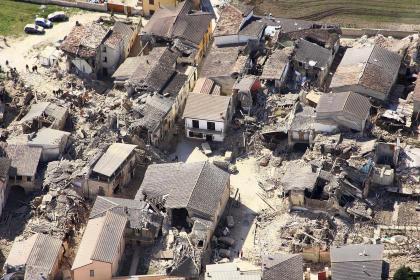Scientists go on trial for failing to predict earthquake
A group of Italian earthquake experts went on trial Tuesday after failing to predict an earthquake that killed hundreds of people.
Six seismologists and a government official were charged last year with manslaughter for giving a false reassuring statement before a 6.3 magnitude quake struck the mountainous city of L’Aquila.

The group are also accused of failing to communicate clear warnings before the lethal quake left 309 inhabitants dead in the central province of Abruzzo in April 2009.
According to the indictment filed last May, the seven are suspected of “negligence and imprudence... of having provided an approximative, generic and ineffective assessment of seismic activity risks as well as incomplete, imprecise and contradictory information.”
The scientific community has come out in support of the seven defendants with 5,000 people signing a petition to Italian President Giorgio Napolitano condemning the action - maintaining that it is impossible to accurately predict the timing and severity of a tremor.
One of the defendant’s lawyers Alfredo Biondi said: “This is a trial which opens on very shaky foundations. You cannot put science on trial.”

The area had suffered 400 tremors in the six months leading up to the event, and the scientists were part of a government panel which met six days prior to the deadly quake to assess the level of danger.
They concluded it was not possible to predict whether the activity was a prelude to a stronger quake.
Dr Wayne Richardson, a senior seismologist from the International Seismological Centre told Yahoo! News today that earthquake prediction is a difficult task.
He said: “It’s hard to make predictions if there is no certainty. Earthquakes don’t happen very often in many places. You can’t make one-off predictions as it would cause all sorts of economic problems.”
He added that scientists were fair in making the statement that it wasn’t possible to predict when an earthquake would happen.

Top geophysicists, including Enzo Boschi, the former president of the National Institute of Geophysics and Volcanology; Giulio Selvaggi, the director of the National Earthquake Centre in Rome; and Claudio Eva, a physics professor at the University of Genoa now face 15 months in jail as well as damages of 50m euros (£45m).
Vincenzo Vittorini, a doctor who founded the association named ‘309 martyrs’ and lost his wife and daughter in the natural disaster, said: “I hope that this trial will change mindsets and will lead to greater attention given to communication on risks.”
“No one expected to be told the exact time of the quake. We just wanted to be warned that we were sitting on a bomb.”

 Yahoo News
Yahoo News 
